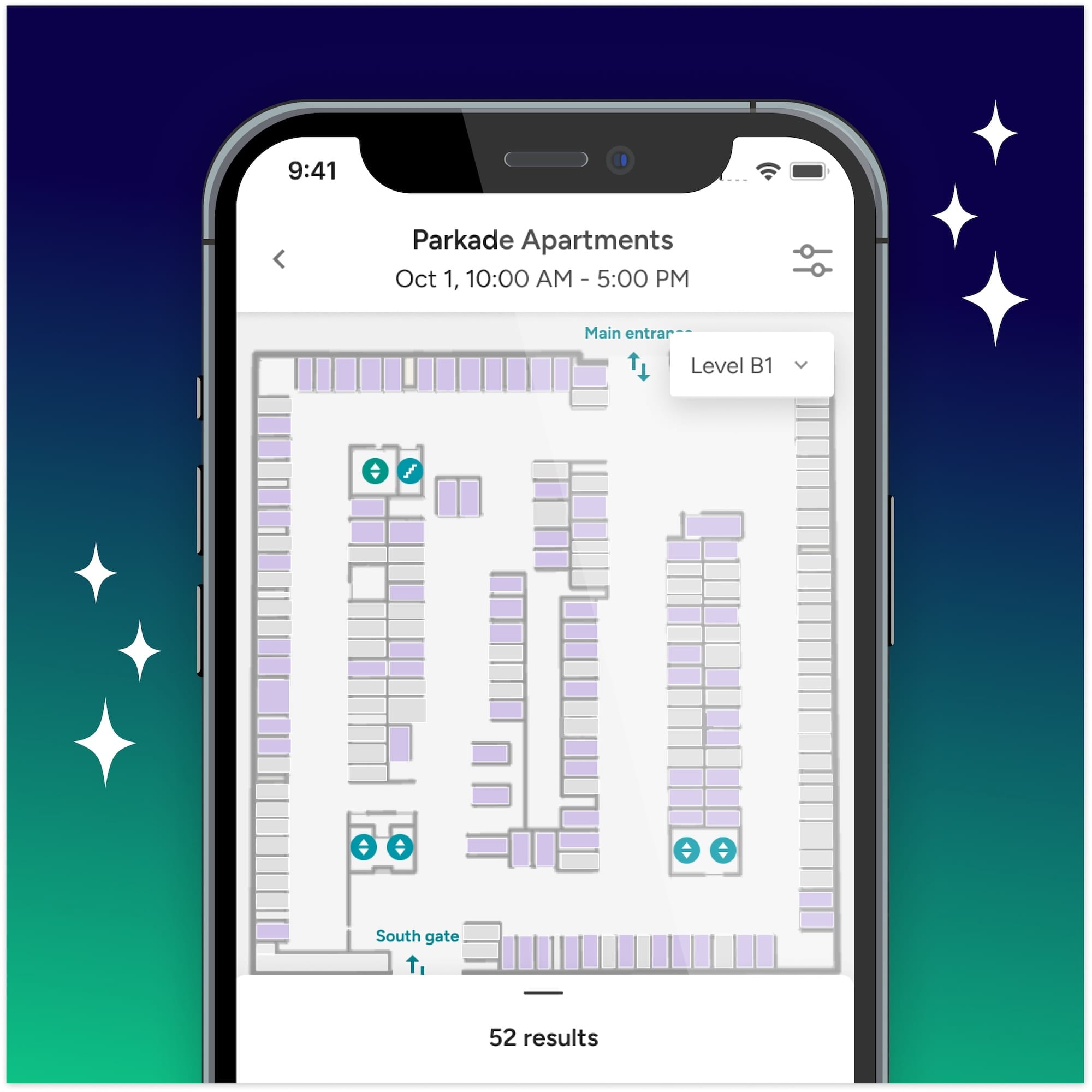

TABLE OF CONTENTS
EV charging stations are becoming a must-have amenity for offices. We’ve highlighted five reasons why, how to make managing these chargers easy for your team and how to recoup the costs of install (if desired).
When a company installs EV charging stations, they’re supporting a greener, better world. Electric vehicles don’t consume gasoline, and EVs can be powered instead by renewable energy, reducing emissions.
Aside from a greener world, there are some great benefits to installing EV chargers for your company.
According to MGSM, 92.1% of millennials believe working for an environmentally and socially responsible company is essential, and 83% of millennials would be more loyal to a company supporting the environment.
A move as simple as installing a few EV charging solutions helps keep a company’s employees satisfied. Those who drive EVs will be reticent to consider leaving the job for one that might not have EV charging for their car. Everyone loves feeling valued, and employees whose needs are met also tend to be more engaged and productive.
Providing essential EV charging spots for employees demonstrates a responsive and committed employer.
Social responsibility has recently become one of the key factors that ensure success.
A study by Unilever reveals that a third of consumers (33%) are now choosing to do business with brands they believe are doing social or environmental good. Enabling greener transport will show all your clients and customers that your company means business.
EV charging at the workplace sends a clear and visible message about where the business stands in terms of reducing the environmental impact of its operations and personnel. Installing EV charging infrastructure will allow every company to demonstrate its climate commitment and engage its stakeholders around an exciting new technology in an efficient and visible way.
Employees expect that their workplace will be environmentally conscious. EV chargers are affordable, but few companies have them. Most employees will perceive it as an incredibly attractive benefit.
“We noticed that the number of EV drivers increased after we started offering workplace charging because it enabled people to commute using their EVs...
But the biggest surprise was how it actually helped us attract and retain talent in the very competitive Bay Area job scene. It really helped us recruit good candidates and keep them happy.” – Facilities Operations Manager, Amazon Lab126
Installing EV charging proves that a company is clearly committed to sustainability. It will also ensure that your company is at the forefront of enabling staff to adopt new technologies. EV chargers can also serve as an incentive for employees to go green.
EVs are about to become the cars of our (near) future. Some states are already taking steps to support EVs and ensure a greener environment. For example, California’s governor Newsom issued an executive order requiring sales of all new passenger vehicles to be zero-emission by 2035. One in five U.S. drivers would get an EV for their next car, and EV charging at work could make this number even higher.
EV charging allows a company to attract new talent, but also new customers.
Unilever reports that 78% of U.S. consumers feel better buying sustainably produced products. According to NMI, consumers are 58% more likely to do business with a sustainable company.
Installing EV chargers at work is likely to attract new customers to a business. Clients decide which companies they should partner with based on many factors, and convenience is one of the most important. When a potential customer arrives at your office for a big deal, they’ll usually arrive in the parking lot.
Seeing a bank of EV chargers makes a great first impression, and shows that you take corporate responsibility and employee happiness seriously,
Investing in EV chargers might sound expensive, as once you include installation costs, an EV charger can cost more than $10,000, and even more if the company opts for DC fast chargers.
EV charging can be a net positive for a company’s budget though, if done smartly.
The chargers will undoubtedly improve employee satisfaction and cost less than many common benefits, such as catering or fitness centers. Also, by making your office parking spots reservable, you can charge your employees and visitors a small fee with Parkade’s help. For example, you could charge $5/day for EV parking and use Chargepoint chargers (which bill users for exactly how much electricity they consumed). Or you could use cheaper chargers, and charge $15-20/day or $3/hr for charging, and not worry about billing precision — while charging enough to net a profit on these chargers. Offices can increase charging station use by allowing public charging after business hours.
That “profit” could be used to recoup the costs of installing chargers, and pay for additional installations to be continually added.
Parkade handles the billing, payments and reservations on a mobile app, so your facilities team doesn’t need to lift a finger.
Adding EV chargers at work brings many benefits and a positive charging experience, as we’ve outlined. However, once the chargers are installed, companies may need to develop a strategy to manage the parking in front of the EV chargers.
Especially at large offices with hundreds or thousands of employees, it’s smart to develop a plan to share the spots equitably among employees, and solve three potential problems that often arise with EV chargers are offices:
Parkade can help with all of that.

With Parkade, companies can better manage parking at EV chargers in real time, allowing more employees to charge their vehicles without necessarily requiring more chargers. Companies that have a limited number of EV chargers can allow their employees to reserve an EV parking spot in advance, for any period of time — hours, days, or months.
Parkade enables EV parking to be time-limited.
EV owners sometimes leave their cars in EV charging spots for too long because they forget their car is charging. Parkade can help regulate the usage of these parking spots by enabling employees and visitors to reserve these spots for specific time periods (and you can charge an hourly rate for that), and then sending notifications when the time is expiring.
Also, for businesses that use Parkade to offer monthly reserved parking to employees, Parkade makes it easy for employees to reshare their EV parking spot when they’re out of the office. If one of your employees decides not to drive to work, or simply doesn’t want to charge their EV, they can share their spot with someone else, for any duration and price.
That ability to reserve long-term EV parking can give peace of mind to your EV drivers, while still maximizing charger usage when they’re not using the spot.
Speaking of prices, a company can use Parkade to charge its employees a small fee for their charging needs. This will encourage even more sharing, and prevent employees from leaving their car in the EV charging spot longer than needed.
The business can use all the money earned to recoup the costs of the existing chargers and keep investing in new ones. After all, EV chargers come at a high price. Residential versions cost a few hundred dollars, whereas EV chargers for commercial use are often priced at a few thousand dollars.
Different businesses may need to assess the requirement to install electric car charging points at their office location in different ways. For example:
Installing EV chargers at work undoubtedly comes with many benefits. By offering more EV charging spots, a company can improve their image, increase employee loyalty, and also attract new customers and new talents.
However, managing limited EV parking spots can be quite challenging. Luckily, Parkade can help your company efficiently handle all those issues.
By offering reservable parking, Parkade can offer employees reliability and predictability of EV parking spots. Also, companies can charge their employees a small fee to ensure better parking utilization, prompt sharing, and recoup charger costs. What’s even better, every company can use Parkade to improve their commute culture in general, not just the usage of EV parking spots. The time has finally come to end parking madness at your workplace!
.jpg)
As parking management becomes increasingly digital, security becomes critical — and we’re excited to share that we've achieved a major security milestone.
Read Story
We’re thrilled to announce one of our most significant leaps forward this year: the launch of dynamic maps across our mobile and web applications.
Read Story
Now that AB 1317 is official, it’s time to brush up on the requirements and see how your properties stand to benefit.
Read Story